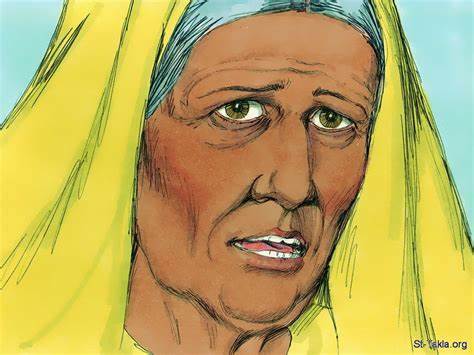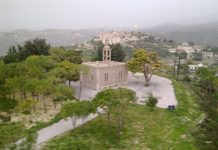حَنَّةُ بِنْتُ فَنُوئِيل أَخَذَتْ تُسَبِّحُ الرَّبّ، وتُحَدِّثُ عنِ الطِّفْلِ جَمِيعَ المُنْتَظِرينَ فِدَاءَ أُورَشَلِيم
إنجيل القدّيس لوقا02/من36حتى40/:” كَانَتْ هُنَاكَ (في أُرشليم) نَبِيَّةٌ طَاعِنَةٌ جِدًّا في أَيَّامِهَا، هِيَ حَنَّةُ بِنْتُ فَنُوئِيل، مِنْ سِبْطِ أَشِير، عَاشَتْ مَعَ زَوْجِهَا سَبْعَ سَنَوَاتٍ مُنْذُ بَكَارَتِهَا، ثُمَّ بَقِيَتْ أَرْمَلةً حتَّى الرَّابِعَةِ والثَّمَانِينَ مِنْ عُمْرِهَا، لا تُفَارِقُ الهَيْكَلَ مُتَعَبِّدَةً بِالصَّوْمِ والصَّلاةِ لَيْلَ نَهَار. فَحَضَرَتْ في تِلْكَ السَّاعَة، وأَخَذَتْ تُسَبِّحُ الرَّبّ، وتُحَدِّثُ عنِ الطِّفْلِ جَمِيعَ المُنْتَظِرينَ فِدَاءَ أُورَشَلِيم. ولَمَّا أَتَمَّ يُوسُفُ ومَريَمُ كُلَّ ما تَقتَضِيهِ شَرِيعَةُ الرَّبّ، عَادَا بِيَسُوعَ إِلى الجَلِيل، إِلى النَّاصِرَةِ مَدِينَتِهِم. وكانَ الطِّفْلُ يَكْبُرُ ويَتَقَوَّى ويَمْتَلِئُ حِكْمَة. وكَانَتْ نِعْمَةُ اللهِ عَلَيْه.”
Prophet, Anna the daughter of Phanuel came, and began to praise God and to speak about the child to all who were looking for the redemption of Jerusalem
Holy Gospel of Jesus Christ according to Saint Luke 02/36-40/:”There was also a prophet, Anna the daughter of Phanuel, of the tribe of Asher. She was of a great age, having lived with her husband for seven years after her marriage, then as a widow to the age of eighty-four. She never left the temple but worshipped there with fasting and prayer night and day. At that moment she came, and began to praise God and to speak about the child to all who were looking for the redemption of Jerusalem. When they had finished everything required by the law of the Lord, they returned to Galilee, to their own town of Nazareth. The child grew and became strong, filled with wisdom; and the favour of God was upon him.”
النبية حنة هي بِنْتُ فَنُوئِيلَ مِنْ سِبْطِ أَشِيرَ (لوقا 36:2). اسم حنة يعني “نعمة” أو “خير” كانت حنة قديسة مسنة تحمل نفس اسم والدة صموئيل (صموئيل الأول 2:1)، مؤسسة مدارس الأنبياء.
كانت حنة نبية (لوقا 36:2). موهبة النبوة كانت تُمنح من وقت لآخر للنساء المتديِّنات، وكذلك للرجال. وكان من بين الأنبياء نساء مثل مريم (خروج 20:15)، ودبورة (قضاة 4:4)، وزوجة إشعياء (إشعياء 3:8)، وخَلْدَةَ (ملوك الثاني 14:22) ، وكذلك بنات فِيلُبُّسَالأرْبَعُ بَنَات العَذَارَى ( أعمال الرسل 9:21).
تشير الأسفار المقدسة إلى أنها كانت ” مُتَقدِّمَةٌ فِي أَيَّامٍ كَثِيرَةٍ، “(لوقا 36:2و37). كانت على الأقل في الرابع والثمانين من عمرها. من غير المؤكد إلى حد ما تُرجم من اليونانية إذا كان التعبير المترجم “وَهِيَ أَرْمَلَةٌ نَحْوَ أَرْبَعٍ وَثَمَانِينَ سَنَةً” ينطبق على عمر حنة أو على مدة ترملها. إذا كانت حنة قد تزوجت في سن ال 15 سنة، وتزوجت لمدة 7 سنوات، ثم بقيت أرملة لمدة 84 عامًا، فسيكون عمرها 106 سنوات. لن يكون هذا مستحيلًا بأي حال من الأحوال، على الرغم من أن سن 84 عامًا سيجعلها أيضًا “مُتَقدِّمَةٌ فِي أَيَّامٍ كَثِيرَةٍ”.
حنة كانت” لاَ تُفَارِقُ الْهَيْكَلَ، ” (لوقا 37:2) مما يعني أنها كانت تحضر بانتظام الخدمات الدينية هناك بالإضافة إلى الشهادة أمام الناس المجتمعين هناك (أعمال الرسل 1:3؛ أعمال الرسل 12:5و20و21و25و42 إلخ). كانت تحضر بأمانة ساعات عبادة الصباح والمساء. كانت حياتها مستغرقة في خدمة الله. لم يكن لديها اهتمامات أخرى لتشتيت انتباهها. إن وجودها المستمر في الهيكل يدل عن المحبة التي خدمت الرب بها. تفاصيل السيرة الذاتية التي يتحدث بها لوقا عن شخصية غامضة مثل حنة في الكتاب المقدس تشهد على الجودة التاريخية لروايته (لوقا 37:2).
عند سماع شهادة سمعان الموحى بها عن يسوع، تأثر قلب حنة ببصيرة ملهمة لرؤية الطفل يسوع الموعود به (متى 17:16). وهكذا، في التكريس، أكد شاهدين ملهمين ما عرفته مريم ويوسف بالفعل عن الطفل. وشكرت حنة الرب وتحدثّت عن المسيح (لوقا 38:2).
في خدمة الرب,
Who was the prophetess Anna in the Bible?
Anna the Prophetess
The prophetess Anna was the daughter of Penuel from the tribe of Asher (Luke 2:36). This name is from the Greek word, “Hannah” ,which means “favor” or “grace.” This woman was an aged saint who bore the same name as that of the mother of Samuel (1 Samuel 1:2), the founder of the schools of the prophets.
She was a prophetess (Luke 2:36). The gift of prophecy was from time to time bestowed upon devout women, as well as upon men. Among the prophetesses were such women as Miriam (Exodus 15:20), Deborah (Judges 4:4), Isaiah’s wife (Isaiah 8:3), Huldah (2 Kings 22:14), and also the four virgin daughters of Philip (Acts 21:9).
The scriptures indicate that she was “advanced in many days” (Luke 2:36–37). She was at the very least 84 years old and more likely well over 100 years old. It is somewhat uncertain from the Greek whether the expression translated “of about fourscore and four years” is to be understood as applying to Anna’s age or to the duration of her widowhood. If Anna had been married at the early age of 15, had been married for 7 years, and then remained a widow for 84 years, she would then be 106 years of age. This would by no means be impossible, though the age of 84 would also make her “of a great age.”
The prophetess “departed not from the temple” (Luke 2:37) which means that she regularly attended the religious services there as well as witnessing before the people who assembled there (Acts 3:1; Acts 5:12, 20, 21, 25, 42; etc.). She faithfully attended the hours of morning and evening worship. Her life was absorbed in the service of God; she had no other interests to distract her attention. Her continuing presence in the temple speaks eloquently of the love with which she served the Lord. The biographical detail with which Luke speaks of an obscure Bible personage such as herself testifies to the historical quality of his account (Luke 2:37).
Upon hearing Simeon’s inspired testimony concerning Jesus, her own heart was touched with inspired insight to see in the child Jesus the promised Messiah (Matthew 16:17). Thus, at the dedication, two inspired witnesses confirmed what Mary and Joseph already knew concerning the child. And she gave thanks to the Lord and spoke of the Messiah (Luke 2:38).
In His service,
BibleAsk Team
فإِنَّ اللهَ لَيْسَ بَظَالِمٍ حَتَّى يَنْسَى عَمَلَكُم، والمَحَبَّةَ التي أَظْهَرْتُمُوهَا مِن أَجْلِ ٱسْمِهِ
الرسالة إلى العبرانيّين06/من09حتى12/:”يا إخوَتِي، إِنَّنَا وَاثِقُونَ مِن جِهَتِكُم، أَنَّكُم في حَالٍ أَفْضَلَ وأَضْمَنَ لِلخَلاص. فإِنَّ اللهَ لَيْسَ بَظَالِمٍ حَتَّى يَنْسَى عَمَلَكُم، والمَحَبَّةَ التي أَظْهَرْتُمُوهَا مِن أَجْلِ ٱسْمِهِ، حِينَ خَدَمْتُمُ القِدِّيسِينَ ومَا زِلْتُم تَخْدُمُونَهُم. ولكِنَّنَا نَوَدُّ أَنْ يُظْهِرَ كُلُّ وَاحِدٍ مِنْكُم هذَا الٱجْتِهَادَ عَيْنَهُ، لِكَي يُحَافِظَ حَتَّى النِّهَايَةِ على مِلْءِ يَقِينِ رَجَائِهِ. وذلِكَ لِئَلاَّ تَصِيرُوا مُتَباطِئِين، بَلْ لِتَقْتَدُوا بِالَّذِينَ بإِيْمَانِهِم وَطُولِ أَنَاتِهِم، يَرِثُونَ الوُعُود.”
For God is not unjust; he will not overlook your work and the love that you showed for his sake in serving the saints, as you still do.
Letter to the Hebrews 06/09-12/:”Even though we speak in this way, beloved, we are confident of better things in your case, things that belong to salvation. For God is not unjust; he will not overlook your work and the love that you showed for his sake in serving the saints, as you still do. And we want each one of you to show the same diligence, so as to realize the full assurance of hope to the very end, so that you may not become sluggish, but imitators of those who through faith and patience inherit the promises.”



















